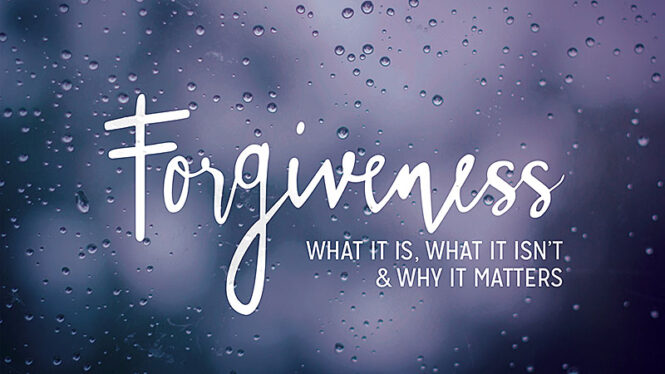
Introduction
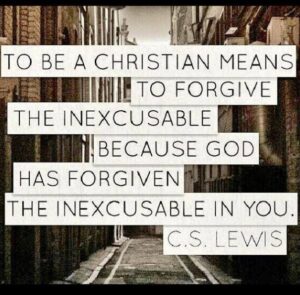 A year or so prior to the date of this post, my high school class from San Leandro High School in San Leandro, California celebrated its 40th reunion. When I heard about it, I planned to go until the Lord convicted me that I was attending with the wrong motives. So in obedience, I chose to stay home and instead bear witness to the cause of Christ and His miraculous doings in my life during the 39 years since I had seen them last.
A year or so prior to the date of this post, my high school class from San Leandro High School in San Leandro, California celebrated its 40th reunion. When I heard about it, I planned to go until the Lord convicted me that I was attending with the wrong motives. So in obedience, I chose to stay home and instead bear witness to the cause of Christ and His miraculous doings in my life during the 39 years since I had seen them last.
This is the post, with only minor edits, that I wrote to the Facebook group created for that reunion explaining my intended absence from the event. It also contains quite a bit of my early personal history that not many people know about, even my brothers and sisters in Christ.
After reading that message, you’ll find some teaching on forgiveness I believe God inspired me to write for you.
My Facebook Post
“God has been dealing with me about my motives for attending the reunion this summer. My conclusion is that it would be inappropriate for my wife and me to attend.
My reasons? Almost none of you know my story and it will help you understand my decision if you do.
Before I showed up in San Leandro, I was a native resident of El Paso, Texas. At school there, I suffered a great deal of abuse at the hands of various teachers and administrators, abuse that were it to have taken place today, would have seen the perpetrators summarily fired as well as publicly castigated and humiliated in the press.
The abuse stemmed from the teachers and administrators at school being completely unable to cope with a perfect storm of my above-average intelligence, my undiagnosed-until-2nd-grade nearsightedness coupled with a last name that saw me constantly seated at the back of the classroom, my undiagnosed-until-age-40 Attention Deficit Disorder (ADD), and my complete lack of any vestige of athletic prowess. In modern terms, I was the arch-typical nerd with a short attention span!
My schoolmates saw the way those officials treated me and determined that I was fair game for their own rejection and bullying. By the time I had endured 8 years of this during kindergarten through 7th grade, I was neurotic and emotionally needy to the point that, when I arrived in California after my father’s near-fatal heart attack, I brought all those problems with me. The vast majority of you simply took up where my former tormentors in Texas had left off.
The Wizard of Oz was my favorite movie throughout childhood and I still tear up whenever I hear “Over The Rainbow.” I recently heard the song playing over the Muzak system at the local mall and tried to explain its emotional impact on me to my wife. As I did so, I suddenly realized that it echoed the emotions of a boy who desperately wanted to be ANYone else, ANYwhere else than who and where he was.
So I endured, rather than enjoyed, my time at Bancroft Junior High and SLHS and, truth be told, I cannot recall much of it that I care to celebrate. Glenn {last name omitted} and Bob {last name omitted}, fellow outcasts, were my only friends at SLHS and, though I have lost touch with Bob, I recently re-connected with Glenn here on Facebook after literally decades of searching for him. We still treasure our friendship to this day.
Amazingly enough, I discovered others during my SLHS years who I, in turn, could look down upon to make me feel better about myself: Tony {last name omitted} and Robert {last name omitted}, to name two.
It was only by the grace of God during our senior year that I didn’t end up in juvenile prison or worse from an occasion when one of the members of this very Facebook group accosted me in the hallway one day, threatening me with a serious beating over a prior incident where I had been attacked by his girlfriend, who had run my bicycle off the road with her car and physically assaulted me — I had pepper-sprayed her to avoid hitting her back.
What he didn’t know at the time was that I had a 6″ razor-honed switchblade knife in my jacket pocket (it was my constant companion every school day, I might add). It was in my hand with my thumb on the button as he cornered me with his forearm across my throat, his face only a few inches from mine. Though totally terrified, I was equally determined to do my best to kill him rather than submit to that indignity. Fortunately for us both, he relented — had he delivered that first blow, he never would have seen the blade coming and both of our lives would have changed drastically for the worse in ways that I cannot even begin to imagine.
Another time prior to my acquiring the knife, I had to break a 2-quart Coke bottle on the curb to arm myself against two other bullies who were following me home with evil intent — their agenda immediately changed when they saw I was prepared to shed their blood to defend myself.
That was but three moments in the social hell I lived in during junior high and high school, but they define the time period quite well.
Three months after graduation, I enlisted in the Army and was stationed in Germany where I met Jesus. While I had attended various Lutheran churches my entire life to that point, I had never had a personal relationship with Him until I ran 6,000+ miles from everyone and everything I had ever known straight into His loving arms.Jesus rescued me from the self-hatred, rejection. and emotional neediness that had dominated my early life. Had He not intervened in my life, I quite possibly would have ended up either as a serial killer or a suicide because of the incredible rage and pain I carried within me. Yet another act of His grace, to my eternal gratitude towards Him, is that it never even crossed my mind to stage my own personal Columbine massacre there at SLHS — I certainly had the rage, the poor self-image, the expert skill as a pistol shooter, and the access to firearms required to put such a plan into action.
Jesus transformed my life. He took an angry, scared, rebellious, insecure boy and over the years between then and now:
- Showed me what it was to be loved and accepted apart from my performance or lack thereof.
- He called me into His ministry and gifted me with the abilities to teach and preach His Word as well as counsel the abused and addicted.
- He gave me a wonderful, lovely, godly wife, calling her to my side from halfway around the world and, against all odds, somehow influenced her to love me — outside of my salvation, she is God’s greatest gift to me.
- He has given me a career as an IT professional, graphic artist, and website designer that has earned me the respect of my friends, associates, and professional peers.
- He has gifted me with two awesome children, one by birth, the other by adoption, who are absolute joys.
- And despite my many, many, MANY stupid choices over the years, he has continued to love me, guide me, correct me, encourage me, heal me, anoint me, and—most importantly — deliver me from impulsively running off my mouth and hurting people.
The famous missionary Dr. David Livingston of “Dr.-Livingston-I-presume” fame said it perfectly:
All that I am I owe to Jesus Christ, revealed to me in His divine book.
I’ve said all that to say this: my attitude when I first RSVPed was I would show up with kind of an “in-your-face” attitude, accompanied by my beautiful wife and armed with a list of career successes as proof that I had been totally misjudged by the lot of you, that I have value and significance as a person, and that I have something of value to offer to others.
What the Lord has shown me is that doing so would be like being born on third base and claiming I hit a triple. I cannot lay claim to being or doing anything of earthly or heavenly value that He has not produced in my life by the power of His Word and His limitless grace. So I’m going to continue to let Him do some more healing on me, renewing my heart and mind on an even deeper level than before.
He also revealed that I needed to walk in a greater level of forgiveness towards you, though I had already initiated that process quite awhile back. Christ set the example for me with one of His final prayers from the cross:
Father, forgive them, for they know not what they do.
Luke 23:34Regardless of your attitude towards me then or now, I have only one thing to say:
I FORGIVE YOU.
I’m praying that everyone of you comes to know the same divine love and forgiveness that I have experienced for almost 39 years. I pray that, in knowing Him, you spend the rest of your lives experiencing His awesome “peace that surpasses all understanding.”
And if any of you ever run across Tony or Robert, I owe them an apology. Please let me know how I can reach them.
Why I Posted This Story Here at This Time
Some of you may be asking yourselves why I published this letter in my blog. After all, some of it is pretty personal and revealing.
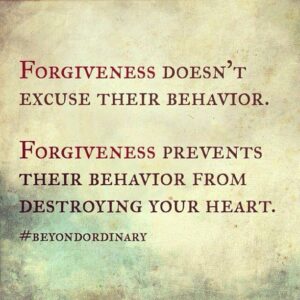 The answer is that I’m just one of a gazillion people out there who have been abused and bullied by their teachers, school administrators, and classmates, not to mention family members. I am demonstrating, through my own life, how to engage in the process of overcoming that abuse through forgiveness.
The answer is that I’m just one of a gazillion people out there who have been abused and bullied by their teachers, school administrators, and classmates, not to mention family members. I am demonstrating, through my own life, how to engage in the process of overcoming that abuse through forgiveness.
To wrap up this story, I’ll tell you how everyone reacted. I had actually expected that, even after 40 years, the universal rejection would continue as before. However — and much to my surprise — many of those who had rejected me back in the day were openly and sincerely shocked at my story and grieved that I had suffered so. One of them, an educator, was so moved she brought up the issue of bullying and added it to the agenda for a meeting she attended. Of course, the believers among them immediately “got it” and several of them are friends now. The rest? Well, let’s just say that their insensitivity and callousness have not abated over the years. The guy I almost stabbed couldn’t be bothered to apologize, so he stayed true to form, as well.
But the freedom I’ve experienced since obeying God in this area has been wonderful, so how anyone else coulda/shoulda/kinda/definitely reacted is entirely irrelevant. They are responsible before God for their behavior and Isaiah 54:17 is very much the operative Scripture for them.
Why is Forgiveness So Important?
 One of the things that Jesus spent quite a few verses dealing with in the Gospels is the concept of forgiveness. The apostles also dealt with it in virtually every letter they wrote. A NT verse on this topic that comes to mind, among many, is the following:
One of the things that Jesus spent quite a few verses dealing with in the Gospels is the concept of forgiveness. The apostles also dealt with it in virtually every letter they wrote. A NT verse on this topic that comes to mind, among many, is the following:
Pursue peace with all people, and holiness, without which no one will see the Lord: looking carefully lest anyone fall short of the grace of God; lest any root of bitterness springing up cause trouble, and by this many become defiled. Hebrews 12:14-15
I’ve said it before and I’ll say it again here: we never sin in a vacuum! What I mean by that is that even the so-called secret sins we commit without anyone else knowing here on earth are known in the spirit realm by God and His angels as well as Satan and his demons. These selfish acts ripple away from us throughout the spirit realm and corrupt every one of our relationships with other people on some level or another, especially our families. The verse in Exodus where it speaks of the sins of the fathers being visited on the 3rd and 4th generations is in play here.
And the 2nd-to-the-top of that secret sin list for the vast majority of the human race is unforgiveness. Not lust, not greed, not gluttony, but a refusal to forgive (the top of the list is idolatry; I’ve already dealt with that topic elsewhere).
 When we allow unforgiveness to take root and we turn bitter, it can drive all sorts of compulsive behaviors and addictions, especially rage-aholism. That’s why one of the crucial steps in any 12-step addiction recovery program (all the steps are based in the Scriptures, I might add) is to forgive all those who have wronged us, no matter how heinous those sins might have been. There’s a saying in recovery circles that illustrates the point I’m trying to make here:
When we allow unforgiveness to take root and we turn bitter, it can drive all sorts of compulsive behaviors and addictions, especially rage-aholism. That’s why one of the crucial steps in any 12-step addiction recovery program (all the steps are based in the Scriptures, I might add) is to forgive all those who have wronged us, no matter how heinous those sins might have been. There’s a saying in recovery circles that illustrates the point I’m trying to make here:
Your refusal to forgive is like you taking poison and expecting the other person to die.
Unforgiveness is toxic, so toxic that bitterness has been linked to cancer as well as heart disease in people’s physical bodies. Like cancer does in a body, bitterness eats away at our souls, taking over healthy areas until our whole mental and emotional being is affected. Eventually, we die of it.
The Parable of the Two Servants
A refusal to forgive is also a manifestation of self-lordship, In other words, it’s an area where we insist on ourselves being on the throne of our lives rather than Jesus. That, of course, is never a safe condition to be in! And Jesus specifically addresses this issue in one of my favorite parables:
Then Peter came to Him and said, “Lord, how often shall my brother sin against me, and I forgive him? Up to seven times?”
Jesus said to him, “I do not say to you, up to seven times, but up to seventy times seven.
“Therefore the kingdom of heaven is like a certain king who wanted to settle accounts with his servants. And when he had begun to settle accounts, one was brought to him who owed him 10,000 talents. But as he was not able to pay, his master commanded that he be sold, with his wife and children and all that he had, and that payment be made.
“The servant therefore fell down before him, saying, ‘Master, have patience with me, and I will pay you all.’ Then the master of that servant was moved with compassion, released him, and forgave him the debt.
“But that servant went out and found one of his fellow servants who owed him 100 denarii; and he laid hands on him and took him by the throat, saying, ‘Pay me what you owe!’
“So his fellow servant fell down at his feet and begged him, saying, ‘Have patience with me, and I will pay you all.’
And he would not, but went and threw him into prison till he should pay the debt. So when his fellow servants saw what had been done, they were very grieved, and came and told their master all that had been done.
“Then his master, after he had called him, said to him, ‘You wicked servant! I forgave you all that debt because you begged me. ‘Should you not also have had compassion on your fellow servant, just as I had pity on you?’ And his master was angry, and delivered him to the torturers until he should pay all that was due to him.
“So My heavenly Father also will do to you if each of you, from his heart, does not forgive his brother his trespasses.”
Matthew 18:21-35
Let’s unpack this story a bit.
The First Servant
First, what the heck is a “talent?” The Bible is not talking about talents as in innate human skills and abilities, but a unit of currency back in that day.
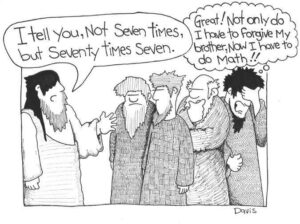 There were two kinds of talents, silver and gold. A silver talent was about 100 pounds (45kg) of the stuff. A gold talent was about 200 pounds (91kg).
There were two kinds of talents, silver and gold. A silver talent was about 100 pounds (45kg) of the stuff. A gold talent was about 200 pounds (91kg).
We have no way of knowing the relative values and buying power of silver and gold in biblical times — such records simply do not exist. But we can get something of a glimpse if we translate those weights into modern currency.
As of this writing, gold was being traded at $1,348/ounce and silver for $20.60/ounce. We don’t know whether the talents in this parable were silver or gold ones, so we can guesstimate the amount owed by the first servant was between close to $32,700 (silver) or $4,327,000 (gold) in modern currency.
Personally, I am convinced Jesus was speaking of gold talents. Why? Because He was trying to make a point that the amount owed by the first servant was a stratospheric sum beyond Peter’s and the other listener’s abilities to imagine owning or owing (since this is strictly my opinion, you are under no obligation to agree with me), so I’ll continue using gold talents in our analysis.
The remarkable part is the king didn’t just give this servant some sort of plan to pay down the debt over time as the servant had begged, but forgave the entire astronomic sum!
The Second Servant
So let’s look at the second servant who owed the first servant 100 denarii. A denarius was equal to one day’s wages at that time, so 100 denarii represented about ⅓ of a year’s wages. We have no means to determine what a denarius was in terms of buying power nor its comparative value versus a gold talent, so I’ll use another modern statistic. According to the latest US census figures, the median income of a US family is close to $50,000/year, or $137/day. That means, in modern terms, the second servant owed the first one about $13,700 dollars. This is a substantial sum well beyond the ability of most Americans to cough up out of savings.
The valuation of these two sums owed is nothing more than a semi-scientific wild guess. That being said, we’re talking about a roughly 1000% difference between the two amounts.
The King
Back to the parable. The king was incensed when the first servant who had been forgiven so huge a sum went after the other servant and was so harsh with him and his family for what — by comparison — was pocket change. So he recanted of his forgiveness towards the first servant and threw him in jail.
The way Jesus, our King, sees it is this: after He paid such a horrific price to purchase forgiveness for our vast collection of selfish, self-destructive, and harmful-to-others choices, who are we to elevate ourselves to His role as Judge and refuse to forgive those who have committed various sins against us, no matter how heinous those sins may have been?
And to put a cherry on this parable sundae: Jesus, God-in-sandals, described the first servant who refused to forgive as “wicked.”
Selah!
The World’s vs. The Bible’s Concept of Forgiveness
- Dictionary (worldly) definition:
- ceasing to feel resentment towards an offender.
- Bible (God’s) definition:
- a deliberate choice to abstain from judgment and to trust God’s justice towards an offender.
Below is a table contrasting these two viewpoints in greater detail:
| Forgiveness IS NOT | Forgiveness IS |
|---|---|
| Abandonment of justice | Trusting God’s justice towards the offender |
| Trusting the offender | A full pardon |
| Making ourselves vulnerable to further abuse | What we must do to obtain forgiveness for ourselves |
| Liking the offender | A commandment of God |
| Friendship with the offender | An act of faith |
| Denial (it never happened) | An act of courage |
| Tolerance (it’s OK) | An act requiring God’s grace |
| Forgetting | Crucial to a successful prayer life |
| Turning the other cheek | Crucial to all present & future relationships |
| Making a joke of the offense | Trusting God to heal the pain |
| Politeness or tactfulness | Overcoming evil with good |
| Passive non-response (stuffing) | The key to freedom |
Forgiveness is a Journey, Not an Event
The choice to forgive is a simple ABC process:
A. I will not raise this against you.
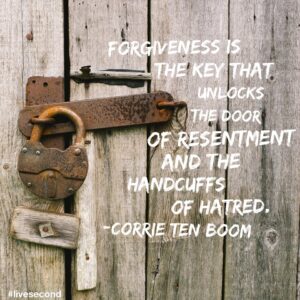 This means that I will never bring the offense up again and throw it into your face, no matter how angry I may be at you for it or whatever else you may do to anger me in the future.
This means that I will never bring the offense up again and throw it into your face, no matter how angry I may be at you for it or whatever else you may do to anger me in the future.
Wives, you need to really listen up on this one, because this is a standard tactic you tend to employ during moments of “intense fellowship” with your husbands.
This is especially important with your kids, as well. If your minor child has disobeyed you and you’ve disciplined him/her for it, never bring it up again. This models God throwing our sins into the “sea of forgetfulness and remembering them no more,” thus always giving us a fresh start. By the way, this is for children who are not in the throes of drug/alcohol abuse or other compulsive behaviors. Addicts are handled differently and that is beyond the scope of this article.
B. I will not raise it with someone else.
In other words, I will not gossip about you and your offense against me to a 3rd party, such as my buddies (men) or girlfriends (women).
Why is this so important?
Because while we have the spiritual and emotional resources required to deal with the situation by God’s grace being more than enough for us to obey Him and not judge the offender, the hearers of your gossip do not have that grace. If you need to seek counsel from someone, say a close friend or counsellor, and tell them gory details, that’s OK — but to go around blabbing to anyone who will stop long enough to listen is not!
C. I will not raise it again.
This doesn’t mean “forgive and forget” because some offenses are simply too heinous, too traumatic to forget. We remember such offenses for the rest of our lives and usually spend that entire time recovering in various degrees from them.
What this does mean is that every time the offense comes to mind, we bring that thought into subjection to the Word of God by choosing to forgive yet again, rather than dwelling on it and rehearsing it over and over again in our minds, allowing resentment and anger to build. And we continue to make that choice again. And again. And again, ad infinitum, ad nauseam.
One time I was ministering this at a chapel service at the Gospel Rescue Mission Women’s & Children’s Shelter in Tucson. Every woman present was the victim of some sort of physical, sexual, emotional, and/or verbal abuse. As I covered this last point, I saw the faces of every women in the room fall and I could sense the tension among them rise.
One of them was bold enough to confront the elephant in the room and blurted out with dismay, “When do we get to stop!?” The Holy Spirit gave me the perfect answer. I replied, “When that offense no longer has the power to make you angry or put you in pain.” Once I said that, everyone relaxed as they realized what the goal was.
As one of my favorite aphorisms goes like this: “The important things are always simple; the simple things are always hard.” Forgiving offenses — especially the big ones like sexual or physical abuse, rape, or murder of a loved one — is NEVER, ever easy — it ALWAYS requires the grace of God to pull off.
Why?
Because we are simply not equipped to deal with the sins of others perpetrated against us. Such situations are a result of living in a fallen world despite our never having been innately created by God to live in anything but a sinless paradise. Bottom line? If you try to do this in your own strength, you WILL fail!
Matthew West’s Forgiveness
 The Christian singer/songwriter Matthew West wrote a song on this topic that warrants a serious read because the final chorus is a model prayer for all of us who need to process forgiving someone and are taking that first terrifying step into the unknown: a future where we are no longer held in the bondage of bitterness and can walk free of our pasts.
The Christian singer/songwriter Matthew West wrote a song on this topic that warrants a serious read because the final chorus is a model prayer for all of us who need to process forgiving someone and are taking that first terrifying step into the unknown: a future where we are no longer held in the bondage of bitterness and can walk free of our pasts.
Here are the lyrics:
Verse 1
It’s the hardest thing to give away
And the last thing on your mind today
It always goes to those who don’t deserve
It’s the opposite of how you feel
When they pain they caused is just too real
Takes everything you have to say the word1st Chorus
Forgiveness, forgivenessVerse 2
It flies in the face of all your pride
It moves away the mad inside
It’s always anger’s own worst enemy
Even when the jury and the judge
Say you’ve got a right to hold a grudge
It’s the whisper in your ear saying, “Set it free!”2nd Chorus
Forgiveness, forgiveness,
Forgiveness, forgiveness,Show me how to love the unlovable
Show me how to reach the unreachable
Help me now to do the impossible
Forgiveness, forgiveness
Help me now to do the impossible
ForgivenessVerse 3
It’ll clear the bitterness away
It can even set a prisoner free
There is no end to what its power can do
So let it go and be amazed
By what you see through eyes of grace
The prisoner that it really frees is youFinal Chorus
Forgiveness, forgiveness,
Forgiveness, forgiveness,
Show me how to love the unlovable
Show me how to reach the unreachable
Help me now to do the impossible
ForgivenessI want to finally set it free
Show me how to see what your mercy sees
Help me now to give what You gave to me
Forgiveness, forgiveness
Forgiveness, forgiveness
A Secular Expert Weighs In On This Topic
Recently, Prager University released a 5-minute video on forgiveness taught by a secular psychiatrist, once again proving that the fundamental truths found in God’s Word can withstand scrutiny in the secular and scientific realm. He makes some important distinctions about the 3 flavors of forgiveness which are definitely worth the listen. Here it is and here is also a link to it if it won’t play for you here.
Conclusion
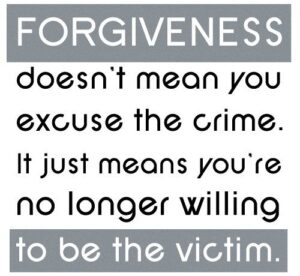 Gail, my fellow contributor here on Miscellaneous Ramblings, has experienced so many incidents of physical and sexual abuse that it is a miracle of God’s grace and mercy that she isn’t a suicide or in some mental institution somewhere. If anyone on this planet is qualified to teach a masters class on forgiveness, she is. In addition to her contributions here, she also penned some words of wisdom I want to share with you:
Gail, my fellow contributor here on Miscellaneous Ramblings, has experienced so many incidents of physical and sexual abuse that it is a miracle of God’s grace and mercy that she isn’t a suicide or in some mental institution somewhere. If anyone on this planet is qualified to teach a masters class on forgiveness, she is. In addition to her contributions here, she also penned some words of wisdom I want to share with you:
Forgiveness is like a jigsaw puzzle. We have all of the pieces and some fit together really quickly. Each time we revisit the puzzle, we see another section, and that comes quickly then — when it was seemingly impossible before. Problem is, the pieces are in a bag, and we can’t see them all at once. Otherwise, we might give up, thinking the whole puzzle an impossible feat.
I hope and pray that, if you find yourself in the place where you need to forgive, that you will engage in this process with the faith, determination, and persistence needed to recover from it.
And thereby find your freedom!
Thanks for reading!
Downloadable Resources
- The same handout I distributed to those ladies at the Gospel Rescue Mission chapel service.
- A mini-poster of Gail’s words quoted above you can print and hang somewhere to comfort and encourage you during your emotional journey.
Both documents are Adobe Acrobat PDF files that can be read with the free Adobe Reader or similar applications, such as Preview.app on the Macintosh.


Thanks for quoting me… LOL… The Holy Ghost has all the right words!
When one is being authoritative on a topic, citing experts is an important aspect of making your point! 🙂